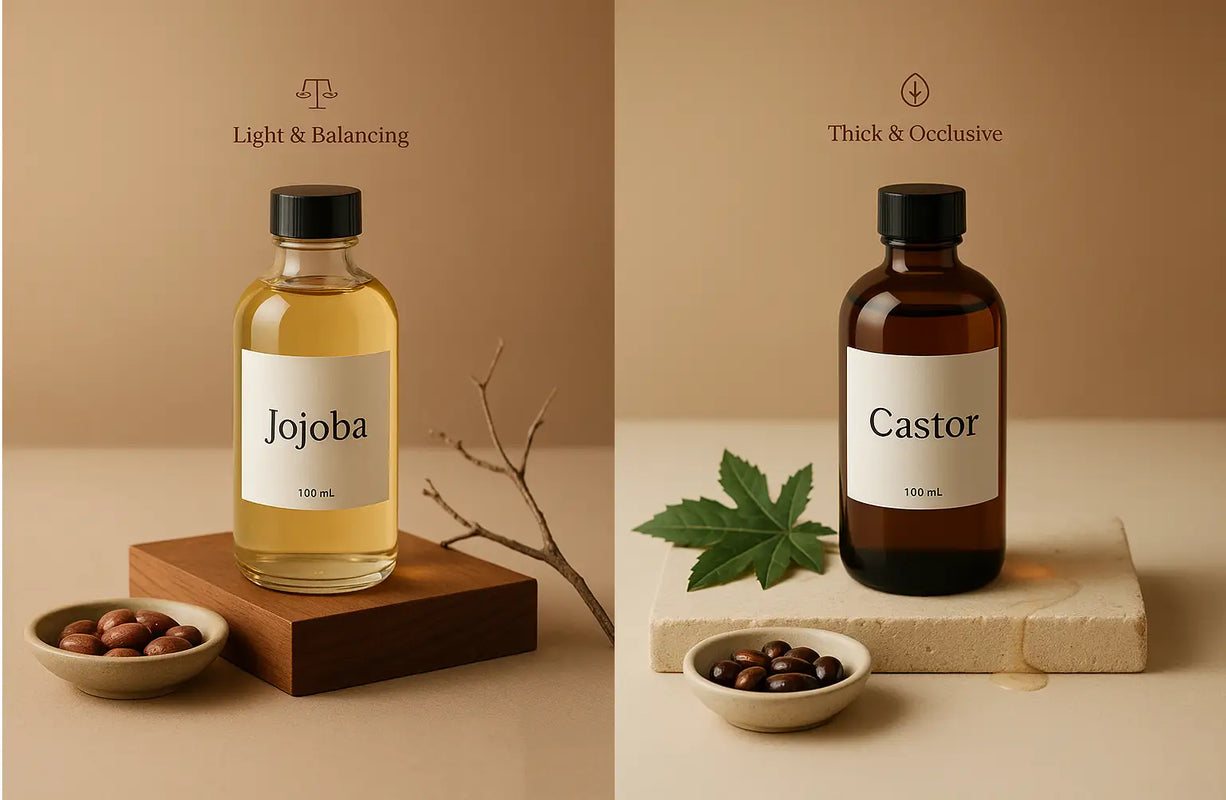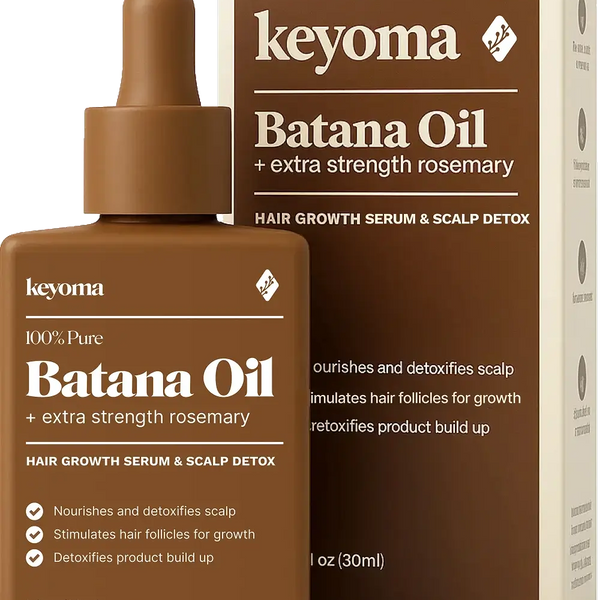In this article
Castor oil and jojoba oil are favorites in the natural hair space, showing up in lots of products and fitting smoothly into almost any routine.
I like both oils for different reasons. I wouldn’t call either one “better,” but one may match your hair goals and needs more closely than the other.
When you choose new hair products, consider your hair type, porosity, overall goals, and what your strands actually need.
What helps my high-porosity, often dry curls might miss the mark for someone with low-porosity waves. Keep your own situation in mind when you compare products.
With that covered, let’s compare jojoba oil and castor oil to see which one belongs in your haircare lineup.
Key Takeaways
-
Choosing between castor and jojoba depends on skin type, hair goals, and needs.
-
Jojoba mimics sebum, absorbs quickly, balances oil, and suits daily moisturizing and makeup removal.
-
Castor is thick and occlusive, hydrates deeply, stimulates circulation, and supports thicker hair.
-
Blending both oils lightens castor’s heaviness, and diluting reduces clogging risk for congested skin.
What is Jojoba Oil?
Jojoba oil is a liquid wax pressed from the seeds of the jojoba shrub, which grows in dry parts of North America. Golden in color with a light nutty scent, it’s made mostly of esters and fatty acids like eicosenoic acid, docosenoic acid, and erucic acid, plus vitamins E and B and trace minerals such as copper, zinc, selenium, iodine, and chromium.
A standout trait is how closely jojoba resembles sebum, the skin’s own oil. Because of that, it absorbs easily without greasiness and can help balance oil output so skin isn’t overly dry or overly oily.

Jojoba Oil Benefits
-
Calms the skin and scalp thanks to anti-inflammatory effects, helping with redness, irritation, and swelling.
-
Moisturizes skin and hair without clogging pores or weighing strands down, easing dryness, flaking, and itch.
-
Helps regulate oil on the skin and scalp, supporting a balanced pH and reducing oily or overly dry patches, acne, dandruff, and infections.
-
Feeds skin and hair with vitamins, minerals, and antioxidants, improving elasticity, texture, and natural shine.
-
Supports repair with antibacterial and antifungal activity, useful for minor cuts, scrapes, burns, and mild infections.
-
Shields skin and hair from sun, wind, pollution, and heat, which can otherwise speed up signs of aging like fine lines and dark spots.
What is Castor Oil?
Castor oil is a plant oil pressed from the seeds of the castor plant, which grows in tropical regions of Africa and Asia. Pale yellow with a strong scent, it’s rich in ricinoleic acid, a monounsaturated fatty acid with moisturizing and anti-inflammatory properties, along with smaller amounts of other fatty acids.
It’s notably thick and sticky, forming a protective film over skin and hair to limit moisture loss and outside damage. It’s also used to encourage circulation, which can improve delivery of oxygen and nutrients to skin and hair cells.

Castor Oil Benefits
-
Deeply hydrates skin and hair because of its high ricinoleic acid content, helping seal in water and limit loss.
-
Aids repair with vitamin E and proteins that support damaged skin and hair, reinforcing structure and function.
-
Cleans the skin and scalp with antibacterial and antifungal effects, lifting buildup that can clog pores or contribute to acne, dandruff, and infections.
-
Helps draw out impurities from the skin and scalp, which many use to support a clearer look and feel.
-
Addresses visible aging by supporting collagen and elastin, softening the look of wrinkles, fine lines, and laxity.
-
Used to support growth by improving local blood flow, which may encourage thicker, longer, stronger hair and lashes while reducing thinning.
How to Choose the Right Oil for Your Needs
Picking between jojoba and castor oil starts with your skin’s needs. Think about your skin type, your goals, and when you’ll use the oil so you can match the texture and feel to your routine.
Sensitive or Easily Congested Skin
Jojoba oil is usually the gentler first step for skin that clogs easily. Because it’s non-comedogenic, it won’t block pores and can balance natural oils instead of overwhelming them. A few drops on damp skin absorbed better for me in testing. That balance is especially helpful if you’re oily or combination but still need hydration.
Castor oil needs more care here. Its heavier texture can be too occlusive for congestion-prone skin, particularly undiluted. If you want to try it, blend with a lighter carrier oil before use.
Daily Moisturizer
For everyday application, jojoba’s light feel and quick soak-in make it a standout. It locks in moisture without a greasy finish, and applying to slightly damp skin often improves absorption.
Castor oil, because it’s thick, works better as an occasional intensive layer than as a daily option. That protective film can feel heavy during the day for many routines.
Blend Both Oils
Mixing the two can strike a nice balance. Jojoba lightens castor’s weight, creating a blend that hydrates well without feeling overly rich. For oily skin, start with mostly jojoba and add just a few drops of castor.
This pairing works because you get jojoba’s balancing effect alongside castor’s deeper occlusive support.
Choose the Best Natural Oils for Your Hair with Keyoma
Choosing between jojoba and castor oil comes down to your hair type, scalp needs, and goals. Jojoba feels light and balances oil. Castor is thicker and seals in moisture. Start with the one that matches your texture and porosity, patch test first, and adjust based on how your hair responds.
For more practical routines, product tips, and research-backed explanations, follow Keyoma’s blog and social channels for regular hair care guidance.
Featured Product
100% Pure Batana Oil + Rosemary









